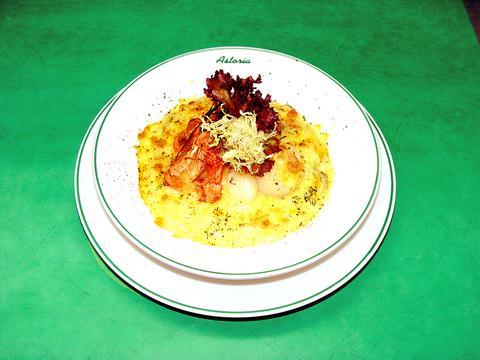A good restaurant feeds the body, but a great restaurant feeds the soul, transporting it to another place or time. The Astoria in Taipei's Wuchang Street is like a portal that takes diners back in time to 1949, to the kind of respectable cafe our Western grandmothers dressed up to lunch at. It provides a feast for the senses with its classic recipes, as well as a few new surprises.
The Astoria was reopened in July by the same family that has kept the bakery downstairs going for 55 years, to the delight of the culturati who had made the place their second home (and like family, patriarch Archiybold Chien fed some of the writers and artists in their lean years). One booth has photos of its longtime literary denizens.

PHOTO COURTESY OF THE ASTORIA
But the food stands up to the challenge of recreating a past. Four salads are offered in the mid-NT$200 price range, including a chef's salad, Russian, Caesar and fruit. The Caesar was satisfying, served with four helmeted but naked prawns. The tiny croutons, bacon and romaine were all perfectly crisp, with a dressing more sweet than redolent of garlic and anchovy.
The smoked salmon spaghetti turned out to be a handsomely made plate of fettucine topped with a wide slice of smoked salmon. Underneath were chunks of fresh salmon in a cream sauce, with a rainbow of delicately julienned peppers and onions.
The "course" menu offers fried meats and seafoods for NT$280 to NT$350. Specials (found not on the menu but on a tabletop card in Chinese only) top the price range with steak and lamb, both NT$580. They also include beef cooked in red wine for NT$380 and something that was described to me as "pancakes with cheese and vegetables" for NT$300.
This turned out to be a surprise -- a large plateful of quesadillas, served with a creamy sauce (that wasn't sour cream) and sweet salsa heady with oregano but lacking the usual smoky cumin. A slight afterburn comes from the canned jalapenos in the lighter-than-tortilla crepes, filled with chicken, cheese and julienned vegetables. You're not in the 1950s anymore. Rounding out the offerings are numerous varieties of coffee, the bakery's pastries and fruit frappes.
This is the place to take your visiting family when they've tired of noisy Chinese restaurants and want to catch their breath.

Taiwan has next to no political engagement in Myanmar, either with the ruling military junta nor the dozens of armed groups who’ve in the last five years taken over around two-thirds of the nation’s territory in a sprawling, patchwork civil war. But early last month, the leader of one relatively minor Burmese revolutionary faction, General Nerdah Bomya, who is also an alleged war criminal, made a low key visit to Taipei, where he met with a member of President William Lai’s (賴清德) staff, a retired Taiwanese military official and several academics. “I feel like Taiwan is a good example of

March 2 to March 8 Gunfire rang out along the shore of the frontline island of Lieyu (烈嶼) on a foggy afternoon on March 7, 1987. By the time it was over, about 20 unarmed Vietnamese refugees — men, women, elderly and children — were dead. They were hastily buried, followed by decades of silence. Months later, opposition politicians and journalists tried to uncover what had happened, but conflicting accounts only deepened the confusion. One version suggested that government troops had mistakenly killed their own operatives attempting to return home from Vietnam. The military maintained that the

Jacques Poissant’s suffering stopped the day he asked his daughter if it would be “cowardly to ask to be helped to die.” The retired Canadian insurance adviser was 93, and “was wasting away” after a long battle with prostate cancer. “He no longer had any zest for life,” Josee Poissant said. Last year her mother made the same choice at 96 when she realized she would not be getting out of hospital. She died surrounded by her children and their partners listening to the music she loved. “She was at peace. She sang until she went to sleep.” Josee Poissant remembers it as a beautiful

Before the last section of the round-the-island railway was electrified, one old blue train still chugged back and forth between Pingtung County’s Fangliao (枋寮) and Taitung (台東) stations once a day. It was so slow, was so hot (it had no air conditioning) and covered such a short distance, that the low fare still failed to attract many riders. This relic of the past was finally retired when the South Link Line was fully electrified on Dec. 23, 2020. A wave of nostalgia surrounded the termination of the Ordinary Train service, as these train carriages had been in use for decades